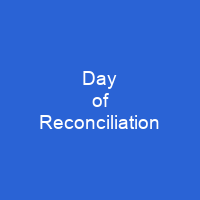The Day of Reconciliation is a public holiday in South Africa held annually on 16 December. The holiday came into effect in 1995 after the end of apartheid. The date was chosen because it was significant to both Afrikaner and African cultures.
About Day of Reconciliation in brief

During the Apartheid era, 16 December continued to be celebrated. The last year South Africa celebrated Day ofTheVow was in 1994. The transition from Day oftheVow to Day ofReconciliation was viewed with mixed emotions for Afrikaans. Africans who did not have the right to vote after the South African War protested against racial discrimination on 16. December. In 1929 and 1934, anti-passpass demonstrations were held by the Communist Party of South Africa. The All African Convention was held during the same time in 1935 covering 15 December through 18 December. Much later, when efforts of passive protest and resistance against apartheid had been unsuccessful, the ANC decided to form a military or armed group.
You want to know more about Day of Reconciliation?
This page is based on the article Day of Reconciliation published in Wikipedia (as of Dec. 18, 2020) and was automatically summarized using artificial intelligence.







